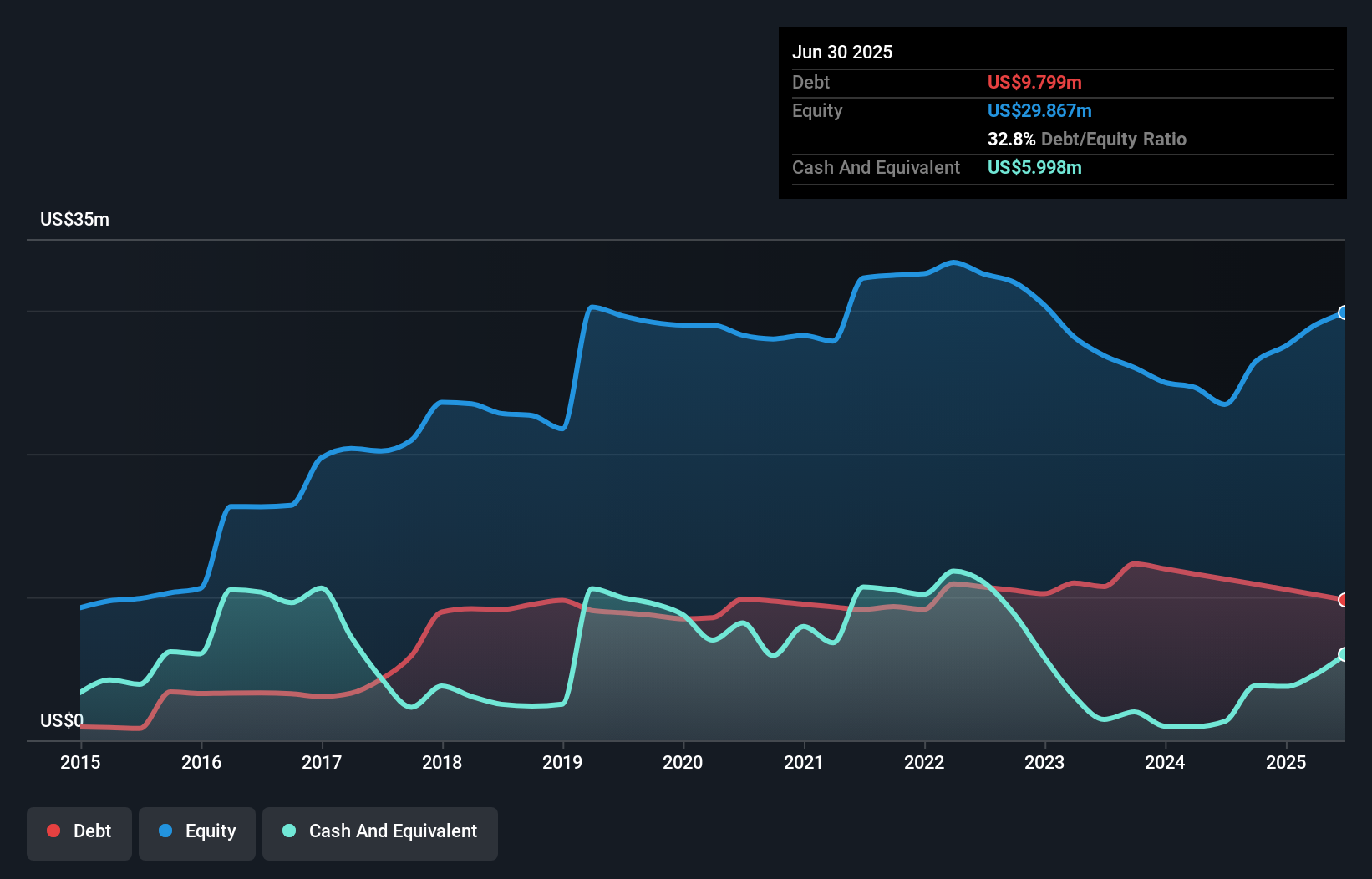- United States
- /
- Biotech
- /
- NasdaqCM:ICCC
These 4 Measures Indicate That ImmuCell (NASDAQ:ICCC) Is Using Debt Reasonably Well
Warren Buffett famously said, 'Volatility is far from synonymous with risk.' When we think about how risky a company is, we always like to look at its use of debt, since debt overload can lead to ruin. We can see that ImmuCell Corporation (NASDAQ:ICCC) does use debt in its business. But the more important question is: how much risk is that debt creating?
When Is Debt Dangerous?
Generally speaking, debt only becomes a real problem when a company can't easily pay it off, either by raising capital or with its own cash flow. Ultimately, if the company can't fulfill its legal obligations to repay debt, shareholders could walk away with nothing. However, a more common (but still painful) scenario is that it has to raise new equity capital at a low price, thus permanently diluting shareholders. Having said that, the most common situation is where a company manages its debt reasonably well - and to its own advantage. When we think about a company's use of debt, we first look at cash and debt together.
What Is ImmuCell's Net Debt?
The image below, which you can click on for greater detail, shows that ImmuCell had debt of US$9.80m at the end of June 2025, a reduction from US$10.9m over a year. On the flip side, it has US$6.00m in cash leading to net debt of about US$3.80m.

How Healthy Is ImmuCell's Balance Sheet?
Zooming in on the latest balance sheet data, we can see that ImmuCell had liabilities of US$4.45m due within 12 months and liabilities of US$12.4m due beyond that. On the other hand, it had cash of US$6.00m and US$2.42m worth of receivables due within a year. So its liabilities outweigh the sum of its cash and (near-term) receivables by US$8.43m.
Given ImmuCell has a market capitalization of US$54.7m, it's hard to believe these liabilities pose much threat. Having said that, it's clear that we should continue to monitor its balance sheet, lest it change for the worse.
Check out our latest analysis for ImmuCell
In order to size up a company's debt relative to its earnings, we calculate its net debt divided by its earnings before interest, tax, depreciation, and amortization (EBITDA) and its earnings before interest and tax (EBIT) divided by its interest expense (its interest cover). This way, we consider both the absolute quantum of the debt, as well as the interest rates paid on it.
While ImmuCell's low debt to EBITDA ratio of 0.79 suggests only modest use of debt, the fact that EBIT only covered the interest expense by 5.5 times last year does give us pause. So we'd recommend keeping a close eye on the impact financing costs are having on the business. Notably, ImmuCell made a loss at the EBIT level, last year, but improved that to positive EBIT of US$2.1m in the last twelve months. There's no doubt that we learn most about debt from the balance sheet. But it is ImmuCell's earnings that will influence how the balance sheet holds up in the future. So if you're keen to discover more about its earnings, it might be worth checking out this graph of its long term earnings trend.
Finally, while the tax-man may adore accounting profits, lenders only accept cold hard cash. So it's worth checking how much of the earnings before interest and tax (EBIT) is backed by free cash flow. Over the last year, ImmuCell recorded free cash flow worth a fulsome 82% of its EBIT, which is stronger than we'd usually expect. That puts it in a very strong position to pay down debt.
Our View
The good news is that ImmuCell's demonstrated ability to convert EBIT to free cash flow delights us like a fluffy puppy does a toddler. And that's just the beginning of the good news since its net debt to EBITDA is also very heartening. Taking all this data into account, it seems to us that ImmuCell takes a pretty sensible approach to debt. While that brings some risk, it can also enhance returns for shareholders. There's no doubt that we learn most about debt from the balance sheet. However, not all investment risk resides within the balance sheet - far from it. For instance, we've identified 1 warning sign for ImmuCell that you should be aware of.
If, after all that, you're more interested in a fast growing company with a rock-solid balance sheet, then check out our list of net cash growth stocks without delay.
New: AI Stock Screener & Alerts
Our new AI Stock Screener scans the market every day to uncover opportunities.
• Dividend Powerhouses (3%+ Yield)
• Undervalued Small Caps with Insider Buying
• High growth Tech and AI Companies
Or build your own from over 50 metrics.
Have feedback on this article? Concerned about the content? Get in touch with us directly. Alternatively, email editorial-team (at) simplywallst.com.
This article by Simply Wall St is general in nature. We provide commentary based on historical data and analyst forecasts only using an unbiased methodology and our articles are not intended to be financial advice. It does not constitute a recommendation to buy or sell any stock, and does not take account of your objectives, or your financial situation. We aim to bring you long-term focused analysis driven by fundamental data. Note that our analysis may not factor in the latest price-sensitive company announcements or qualitative material. Simply Wall St has no position in any stocks mentioned.
About NasdaqCM:ICCC
ImmuCell
An animal health company, develops, manufactures, and sells products that enhance the health and productivity of dairy and beef cattle in the United States and internationally.
Flawless balance sheet with acceptable track record.
Similar Companies
Market Insights
Community Narratives




